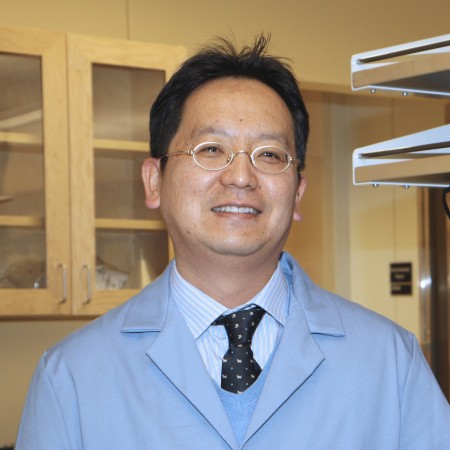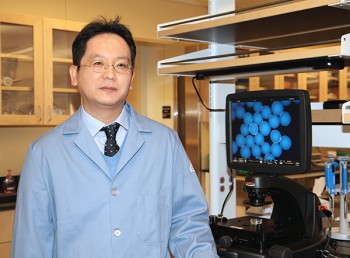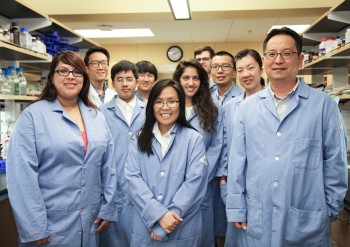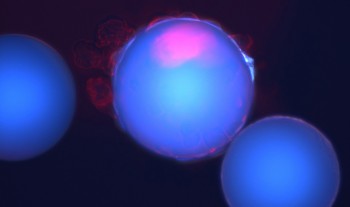Post. Doc.
The Scripps Research Institute - 2012

Professional Preparation
Ph.D.
UT Southwestern Medical Center - 2009
UT Southwestern Medical Center - 2009
M.S.
Yonsei University - 2001
Yonsei University - 2001
B.S.
Yonsei University - 1999
Yonsei University - 1999
Publications
Novel cell-penetrating-amyloid peptide conjugates preferentially kill cancer cells 2018 - Journal Article
Discovering alkylamide derivatives of bexarotene as new therapeutic agents against triple-negative breast cancer 2018 - Journal Article
Facile synthesis of autophagonizer and evaluation of its activity to induce autophagic cell death in apoptosis-defective cell line 2016 - Journal Article
Toward the Molecular Mechanism(s) by Which EGCG Treatment Remodels Mature Amyloid Fibrils 2013 - Journal Article
Appointments
Assistant Professor
University of Texas at Dallas [2012–Present]
University of Texas at Dallas [2012–Present]
Research Associate
The Scripps Research Institute [2009–2012]
The Scripps Research Institute [2009–2012]
Graduate Student
UT Southwestern [2005–2009]
UT Southwestern [2005–2009]
Graduate Student Research Assistant
UT Southwestern [2005–2009]
UT Southwestern [2005–2009]
News Articles
Professor Uses Chemistry and Protein Research to Battle Disease
 Lee’s research focuses on using chemistry-based approaches and technologies to address challenging problems in biology and medicine. His work on the intricacies of interactions among proteins, for example, has applications to better understanding how protein malfunctions contribute to neurodegenerative diseases such as Alzheimer’s and spinocerebellar ataxia. “Understanding protein-protein interaction is very important for biology, medicine and drug discovery,” Lee said. “However, current technologies are limited. They give us static information about protein interaction, but what we need is to track how proteins behave in real-time, throughout the protein’s lifetime. “I’m developing chemistry-based technology for this kind of study, which hopefully will allow us to develop new drugs that maximize potency while minimizing side effects,” said Lee, who is co-inventor on three patents.
Lee’s research focuses on using chemistry-based approaches and technologies to address challenging problems in biology and medicine. His work on the intricacies of interactions among proteins, for example, has applications to better understanding how protein malfunctions contribute to neurodegenerative diseases such as Alzheimer’s and spinocerebellar ataxia. “Understanding protein-protein interaction is very important for biology, medicine and drug discovery,” Lee said. “However, current technologies are limited. They give us static information about protein interaction, but what we need is to track how proteins behave in real-time, throughout the protein’s lifetime. “I’m developing chemistry-based technology for this kind of study, which hopefully will allow us to develop new drugs that maximize potency while minimizing side effects,” said Lee, who is co-inventor on three patents.
Grant Will Fund Team's Breast Cancer Work
 The Cancer Prevention and Research Institute of Texas (CPRIT) recently awarded a grant to Dr. Jiyong Lee, assistant professor of chemistry at The University of Texas at Dallas, for research that may lead to more effective treatments for breast cancer and methods to prevent its recurrence in patients.
The Cancer Prevention and Research Institute of Texas (CPRIT) recently awarded a grant to Dr. Jiyong Lee, assistant professor of chemistry at The University of Texas at Dallas, for research that may lead to more effective treatments for breast cancer and methods to prevent its recurrence in patients.Lee’s CPRIT grant of $194,500 will support research aimed at identifying biological targets on breast cancer stem cells that might be susceptible to novel tumor-suppressing drugs.
University Scientists Isolate Cancer Stem Cells Using Novel Method
 Researchers at The University of Texas at Dallas have devised a new technique to isolate aggressive cells thought to form the root of many hard-to-treat metastasized cancers — a significant step toward developing new drugs that might target these cells.
Researchers at The University of Texas at Dallas have devised a new technique to isolate aggressive cells thought to form the root of many hard-to-treat metastasized cancers — a significant step toward developing new drugs that might target these cells. “Our lab is interested in finding ways to prevent cancer recurrence,” said Dr. Jiyong Lee, assistant professor in the Department of Chemistry and Biochemistry in the School of Natural Sciences and Mathematics at UT Dallas. “The problem is, not all cancer cells are equal.